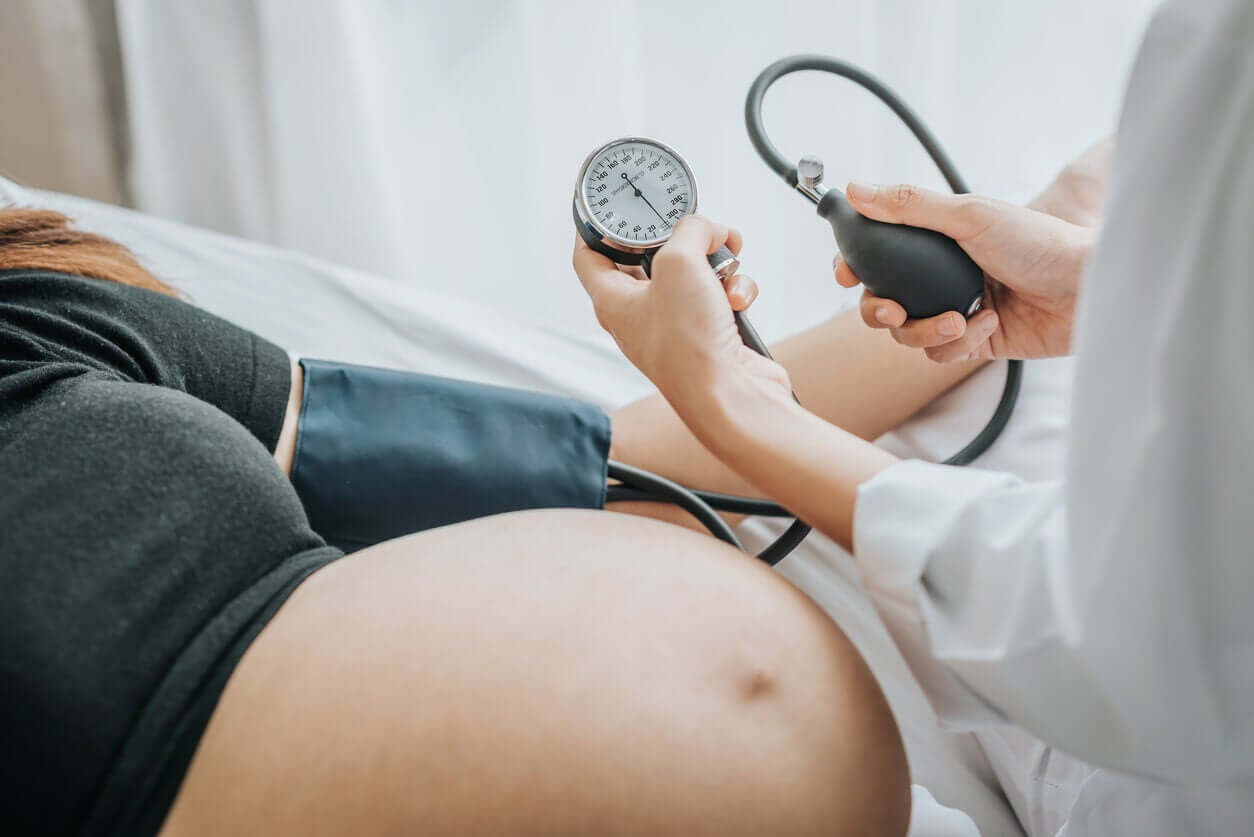How to Avoid a Swollen Face During Pregnancy?


Written and verified by the dermatologist Maria del Carmen Hernandez
A swollen face during pregnancy can be a common manifestation or part of a complex health condition, called pre-eclampsia.
Although most often, swelling in the feet and ankles is more common due to water retention, it can also appear on the face. Fortunately, its appearance can often be prevented or improved with a few simple recipes. We’ll tell you all about them below.
Causes of a swollen face in women during pregnancy
During pregnancy, there are many changes in the mother’s body, from the appearance of the skin and hair, to stretch marks or swelling of some parts of the body.
Most pregnant women experience swelling of the feet and ankles as the total volume of body water increases up to 8 liters. This occurs, in part, due to the increase in blood plasma to respond to the demands of the placenta and the baby.
In general, excess fluid in the body tends to manifest itself in the parts of the body farthest from the heart, such as the fingers, legs, feet, and ankles.
Also read: How Do Hormonal Changes Affect the Skin After Childbirth?
Tips to avoid a swollen face during pregnancy
Sometimes, facial swelling in pregnancy can be prevented or improved with a few simple strategies. However, if you experience sudden or gradually worsening swelling on your face, hands, or around your eyes that’s associated with high blood pressure, you need to call your obstetrician right away. This could be a manifestation of preeclampsia, which requires urgent medical intervention.
Next, we’ll share some homemade measures to improve the appearance of your face.
1. Control weight gain

Eating foods rich in potassium (bananas, sweet potatoes, spinach, squash, and avocados) is recommended to remove sodium from the body and increase urine production.
Also, it’s important to limit your consumption of foods that are high in sodium, such as fast food, potato chips, and processed foods.
A proper prenatal diet, full of minerals, vitamins, and the basic food groups is essential for any pregnancy. Likewise, you need to eliminate alcohol, reduce caffeine, and avoid any chemical substance that hasn’t been approved by a doctor.
2. Perform lymphatic drainage
Normal swelling can peak in the third trimester of pregnancy and affect the legs in particular. For this, massages are recommended that stimulate lymphatic drainage in all parts of the body, including the face.
In pregnant women, the return of blood from the extremities to the heart is more complicated, causing fluid retention in these areas. Even the large size of the uterus compresses the inferior vena cava, which is responsible for returning blood from half of the body.
3. Avoid excessive consumption of salt
The massive increase in body fluids during pregnancy is related to increased levels of sodium in the blood. This mineral alters the way the body absorbs and processes water.
The American Pregnancy Association recommends minimizing sodium intake and avoiding adding salt to meals. In fact, this seasoning is a great enemy of the kidneys when consumed in excess. As a substitute, aromatic herbs or certain spices can be used that give the food a lot of flavor.
You may be interested: Swollen Feet After Childbirth: What You Need to Know
4. Perform physical exercise
You should always consult with your doctor before starting any type of physical activity so that they can indicate whether it’s advisable or not. As a general rule, it’s best not to go through pregnancy in a sedentary way, so any type of sport of moderate intensity usually works.
Physical activity keeps a person active and helps improve blood circulation.
5. Drink enough water
Drinking sufficient amounts of fluid is important for the health of the entire body. In fact, dehydration is one of the causes of bloating in pregnancy.
What is pre-eclampsia?

When abnormal swelling is experienced, this can be a sign of a serious condition in the pregnant woman, called pre-eclampsia. According to the Preeclampsia Foundation, a swollen face can be accompanied by the following symptoms:
- Headache
- Sight loss
- Sudden weight gain or shortness of breath
- High blood pressure
- Nausea or vomiting in the last stage of pregnancy
However, many of the signs can be silent, so proper prenatal care is recommended.
The importance of preventing swelling of the face in pregnancy
While swelling during pregnancy can be bothersome, it’s not too painful and there are a number of ways to improve it.
It’s important to know that when accompanied by other symptoms, this can represent a potentially serious condition. Therefore, it’s important to carry out all prenatal controls indicated by your doctor.
A swollen face during pregnancy can be a common manifestation or part of a complex health condition, called pre-eclampsia.
Although most often, swelling in the feet and ankles is more common due to water retention, it can also appear on the face. Fortunately, its appearance can often be prevented or improved with a few simple recipes. We’ll tell you all about them below.
Causes of a swollen face in women during pregnancy
During pregnancy, there are many changes in the mother’s body, from the appearance of the skin and hair, to stretch marks or swelling of some parts of the body.
Most pregnant women experience swelling of the feet and ankles as the total volume of body water increases up to 8 liters. This occurs, in part, due to the increase in blood plasma to respond to the demands of the placenta and the baby.
In general, excess fluid in the body tends to manifest itself in the parts of the body farthest from the heart, such as the fingers, legs, feet, and ankles.
Also read: How Do Hormonal Changes Affect the Skin After Childbirth?
Tips to avoid a swollen face during pregnancy
Sometimes, facial swelling in pregnancy can be prevented or improved with a few simple strategies. However, if you experience sudden or gradually worsening swelling on your face, hands, or around your eyes that’s associated with high blood pressure, you need to call your obstetrician right away. This could be a manifestation of preeclampsia, which requires urgent medical intervention.
Next, we’ll share some homemade measures to improve the appearance of your face.
1. Control weight gain

Eating foods rich in potassium (bananas, sweet potatoes, spinach, squash, and avocados) is recommended to remove sodium from the body and increase urine production.
Also, it’s important to limit your consumption of foods that are high in sodium, such as fast food, potato chips, and processed foods.
A proper prenatal diet, full of minerals, vitamins, and the basic food groups is essential for any pregnancy. Likewise, you need to eliminate alcohol, reduce caffeine, and avoid any chemical substance that hasn’t been approved by a doctor.
2. Perform lymphatic drainage
Normal swelling can peak in the third trimester of pregnancy and affect the legs in particular. For this, massages are recommended that stimulate lymphatic drainage in all parts of the body, including the face.
In pregnant women, the return of blood from the extremities to the heart is more complicated, causing fluid retention in these areas. Even the large size of the uterus compresses the inferior vena cava, which is responsible for returning blood from half of the body.
3. Avoid excessive consumption of salt
The massive increase in body fluids during pregnancy is related to increased levels of sodium in the blood. This mineral alters the way the body absorbs and processes water.
The American Pregnancy Association recommends minimizing sodium intake and avoiding adding salt to meals. In fact, this seasoning is a great enemy of the kidneys when consumed in excess. As a substitute, aromatic herbs or certain spices can be used that give the food a lot of flavor.
You may be interested: Swollen Feet After Childbirth: What You Need to Know
4. Perform physical exercise
You should always consult with your doctor before starting any type of physical activity so that they can indicate whether it’s advisable or not. As a general rule, it’s best not to go through pregnancy in a sedentary way, so any type of sport of moderate intensity usually works.
Physical activity keeps a person active and helps improve blood circulation.
5. Drink enough water
Drinking sufficient amounts of fluid is important for the health of the entire body. In fact, dehydration is one of the causes of bloating in pregnancy.
What is pre-eclampsia?

When abnormal swelling is experienced, this can be a sign of a serious condition in the pregnant woman, called pre-eclampsia. According to the Preeclampsia Foundation, a swollen face can be accompanied by the following symptoms:
- Headache
- Sight loss
- Sudden weight gain or shortness of breath
- High blood pressure
- Nausea or vomiting in the last stage of pregnancy
However, many of the signs can be silent, so proper prenatal care is recommended.
The importance of preventing swelling of the face in pregnancy
While swelling during pregnancy can be bothersome, it’s not too painful and there are a number of ways to improve it.
It’s important to know that when accompanied by other symptoms, this can represent a potentially serious condition. Therefore, it’s important to carry out all prenatal controls indicated by your doctor.
All cited sources were thoroughly reviewed by our team to ensure their quality, reliability, currency, and validity. The bibliography of this article was considered reliable and of academic or scientific accuracy.
- Widen, E M, and D Gallagher. Body composition changes in pregnancy: measurement, predictors and outcomes. European journal of clinical nutrition vol. 68,6 (2014): 643-52. doi:10.1038/ejcn.2014.40. Disponible: https://www.ncbi.nlm.nih.gov/pmc/articles/PMC4078736/
- Soma-Pillay P, Nelson-Piercy C, Tolppanen H, Mebazaa A. Cambios fisiológicos en el embarazo. Cardiovasc J Afr . 2016; 27 (2): 89-94. doi: 10.5830 / CVJA-2016-021. Disponible en: https://www.ncbi.nlm.nih.gov/pmc/articles/PMC4928162/
- Signs & symptoms. November 2020. [Internet] Disponible en: https://www.preeclampsia.org/signs-and-symptoms
- Swelling during pregnancy. [Internet] Disponible en: https://americanpregnancy.org/healthy-pregnancy/pregnancy-health-wellness/swelling-during-pregnancy/
This text is provided for informational purposes only and does not replace consultation with a professional. If in doubt, consult your specialist.








